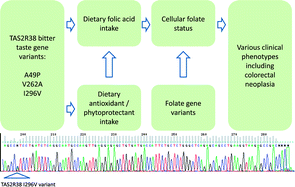Mark Lucock and co-workers from Australia have investigated the variation in bitter taste genetics and how this affects nutrient intake. Variations in taste perception can influence dietary preferences and therefore also influence nutrient intake.  For example, the bitter taste of folate-rich cruciferous vegetables (such as cabbage and broccoli) is thought to be linked to their unpopularity. Low consumption of these types of vegetables may increase the risk of developing adenomatous polyps/colorectal cancer, which are related to folate metabolism. Recent research into bitter taste has focused on the TAS2R38 gene, variations in which are known to alter bitter perception.
For example, the bitter taste of folate-rich cruciferous vegetables (such as cabbage and broccoli) is thought to be linked to their unpopularity. Low consumption of these types of vegetables may increase the risk of developing adenomatous polyps/colorectal cancer, which are related to folate metabolism. Recent research into bitter taste has focused on the TAS2R38 gene, variations in which are known to alter bitter perception.
In this work the relationship between variations in the TAS2R38 gene, red cell folate status as a model of folate-rich food consumption, and risk of developing polyps was investigated. They demonstrated that bitter taste genetics interacted with red cell folate status to predict the occurrence of colonic adenomatous polyps, a recognised precursor of colon cancer.
To find out more, read the article in full for free by following the link below:
TAS2R38 bitter taste genetics, dietary vitamin C, and both natural and synthetic dietary folic acid predict folate status, a key micronutrient in the pathoaetiology of adenomatous polyps, Mark Lucock, Xiaowei Ng, Lyndell Boyd, Virginia Skinner, Ron Wai, Sa Tang, Charlotte Naylor, Zoe Yates, Jeong-Hwa Choi, Paul Roacha and Martin Veysey, Food Funct., 2011, DOI: 10.1039/c1fo10054h










